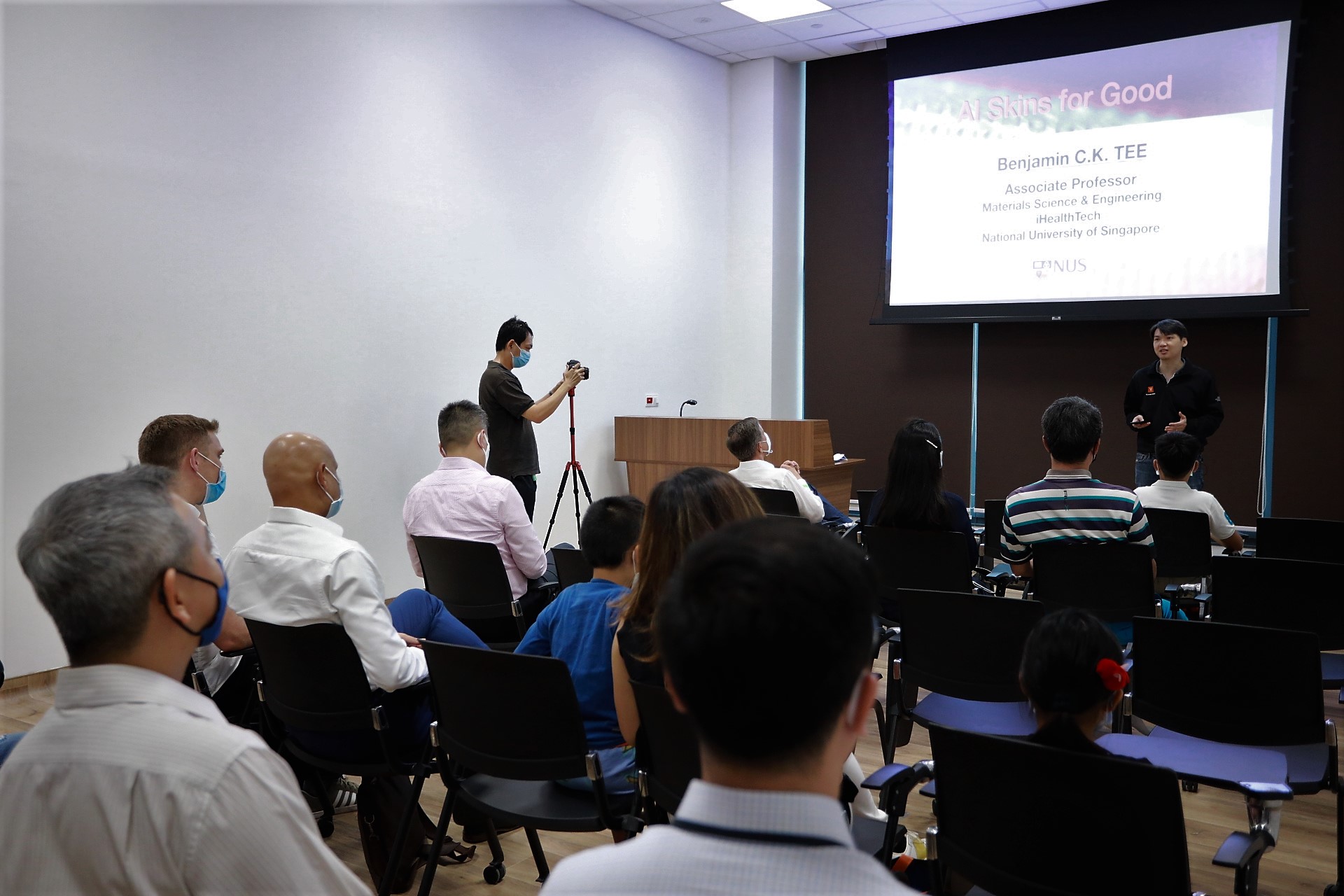Members from the Tan Jiak Kim Circle enjoyed an exclusive visit to the NUS Sensor.AI Systems Labs.
Artificial Intelligence (AI) and other smart technologies are revolutionising nearly every aspect of our healthcare ecosystem. From data management to novel treatment therapies that improve patient outcomes, AI continues to unlock new ways to optimise medical services and healthcare.
On 18 March 2022, members from the Tan Jiak Kim Circle (TJK Circle) were invited for an exclusive visit to the National University of Singapore (NUS) Sensor.AI Systems Labs with Associate Professor Benjamin Tee from the NUS College of Design and Engineering. Guests were treated to a unique insight into how nanoscience and AI are used to create intelligent materials, devices and systems that have the potential to advance innovative healthcare solutions.
The visit is part of a series of specially-curated stewardship events where they have the opportunity to experience the University’s efforts in innovation and enterprise, to create a better world.
The TJK Circle honours Mr Tan Jiak Kim, who led the Chinese community to raise funds to establish Singapore’s first medical college in 1905 and thus laid the foundation for an institution that would later become NUS. The TJK Circle recognises donors who have made an annual gift of S$10,000 to below S$100,000 to the University.

Prof Tee addressing guests during the “AI E-Skins for Good” talk.
Prof Tee opened the event with a welcome address and talk titled “AI E-Skins for Good”, where he shared the research that the team at the Labs is doing and how it might impact lives for generations to come. Prof Tee and his team adopts a highly multidisciplinary approach using materials science, nano and micro-electronics, as well as AI to build digital platforms to realise impactful hardware and software, like electronic skins, for good. The team envisions that these electronic skin technologies will augment our human abilities and aid in applications in the areas of health diagnostics, surgery and predictive analytics, such as health-sensing electronic skins and neuro-prosthetic devices.
“I would like to thank you, our benefactors who have continuously and generously supported us over the years. Your support has truly enabled us, researchers and students, at the University to thrive and to achieve even greater excellence,” shared Prof Tee, expressing his gratitude to all the donors who were present at the event.
After the insightful talk, Prof Tee took the guests on a tour of the Labs, including experiencing first-hand some of the technologies developed, such as HOPES, a home-use eye pressure screening device for glaucoma patients. This project won the James Dyson Foundation International Award in 2021, the first time that a Singaporean team has won in 17 years . Guests were able to tinker with the device and try using it for themselves.

NUS researchers explaining how the HOPES device works for glaucoma patients.
They were also able to experience the STMNIST, a novel neuromorphic Spiking Tactile Database (ST-MNIST) for handwritten digits classification, and AI FOAM, artificially innervated self-healing foams as synthetic piezo-impedance sensor skins.

Guests enjoying a sneak peek of how the STMNIST (right) and the AI FOAM devices work.
Through the visit, guests enjoyed a peek at the various facilities within the NUS Sensor.AI Systems Labs and hear from Professor Tee and his team, on their diverse research interests and projects. The guests were also able to witness firsthand how their support has enabled the University to advance its mission to educate, inspire and transform.
NUS continues to engage in robust research and innovate solutions that improve lives and creates better understanding of the world for a better Singapore and beyond – a commitment that started more than 115 years ago.






